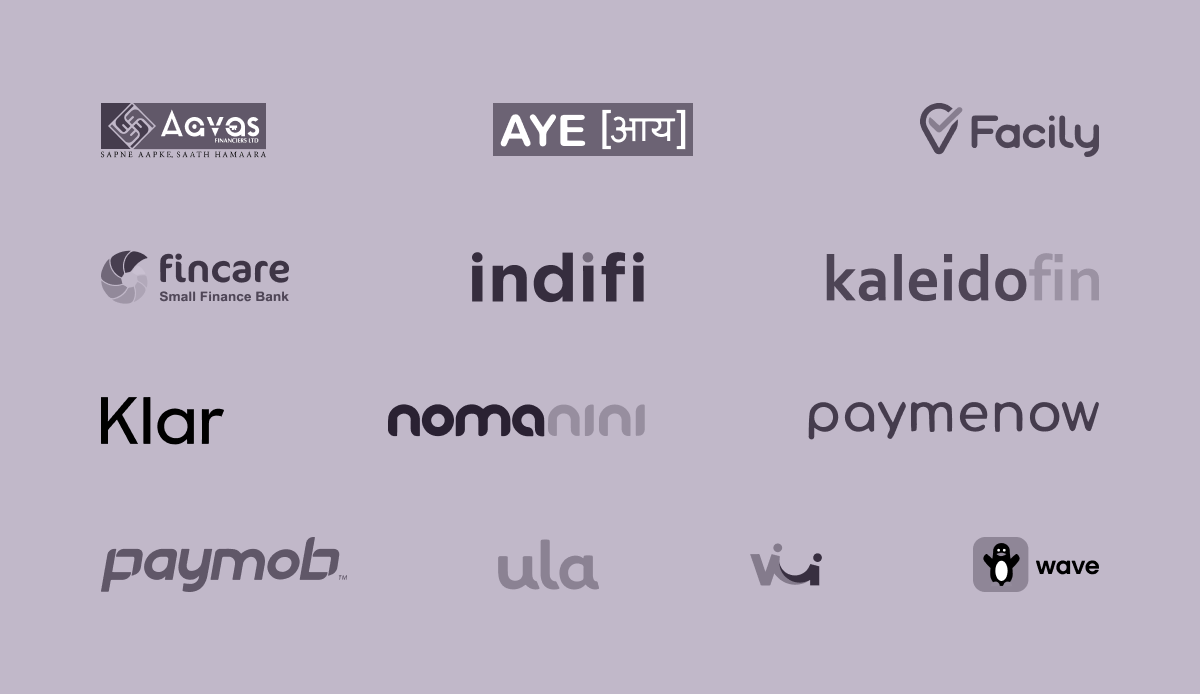
Exploring fintechs in the 60dB Financial Inclusion Benchmarks
We recently launched the 60dB Financial Inclusion Benchmarks – a free interactive tool for financial organisations to see how they compare against the social performance of 134 companies, across 45 countries, via feedback from 58,167 customers. Included within this data set are results from many impact measurement projects we’ve completed within the fintech space.
The Benchmarks are the result of our ongoing work delivering Lean Data projects around the world. By asking the same questions across multiple projects, we are able to develop benchmarks from never-before published, high-quality impact data. The data within the Benchmarks is updated on a quarterly basis.
Some fintechs you’ll find in the Financial Inclusion Benchmarks
The Benchmarks include 134 companies and organizations providing financial services like lending, insurance, savings and payments, financial management & education tools, and innovative financial access solutions, either in-person or digitally, to clients from the past 3 years. Here are some of the fintechs whose performance data have contributed to these Benchmarks:
Aavas Financiers is a leading housing loan finance company in India offering various types of home loans at competitive interest rates.
Aye Finance aims to provide innovative and customer-centric financial services to micro enterprises to power their growth into the new-age India.
Facily is a Brazilian-based social commerce marketplace that pays producers more and gives reasonable prices to those who buy products via its gamified app, which connects consumers to the best prices through group purchases.
Fincare Small Finance Bank offers a suite of smart banking products, recognizing digital as the currency that is going to radically change the future of banking in India.
Indifi helps small businesses in India secure loans and lines of credit.
Kaleidofin is a wealth-tech platform based in India. Their goal-based approach combines the power of savings, investment, credit and insurance into a solution for customers of banks, MFIs, NGOs, and corporates.
Klar is a Mexico City-based digital bank offering digital alternatives to traditional credit and debit services.
Nomanini is a platform connecting financial service providers and fast moving consumer goods companies to retail MSMEs.
Paymenow is a financial wellness and inclusion platform that allows employees early access to a percentage of their already earned wages (Earned Wage Access) before payday, to cover unexpected or emergency expenses without having to get a costly loan.
Paymob is an Egypt-based fintech enabling greater access to digital payments for small and medium enterprises in emerging markets.
Ula is an Indonesian fintech focused on helping small retailers better manage their resources through technology, to improve their margins and grow their business.
Vui App is and Earned Wage Access platform bridging the gap between paydays, developed by Nano Technologies Vietnam, serving all three stakeholders: employees, companies and society at large.
Wave offers mobile money services to users across Senegal, Côte d’Ivoire, Burkina Faso, Mali, Uganda and Gambia.
Check out the ‘Who’s Included’ tab on the Financial Inclusion Benchmarks page for the full list of companies.
Financial Inclusion Benchmark indicators, explained
Client Protection: % of clients who strongly agree that penalties, fees and interest rates of the financial service/product are clear
Why is client protection important? It’s simple for a company to claim that they’re implementing ethical business practices. As fintech becomes increasingly regulated worldwide, governments and regulators will need real evidence of these practices, grounded in customer voice.
Resilience: % of clients whose ability to face a major unexpected expense has ‘very much improved’ because of the financial product/service
Why is resilience important? The ability to manage unexpected financial emergencies expands a client’s capacity to withstand and adapt to challenges, and establishes a foundation of trust.
Agency: % of clients whose ability to manage finances has ‘very much’ increased because of the financial product/service
Why is agency important? Financial freedom will encourage your customers to grow, and more responsible, confident customers will lead to better business outcomes.
